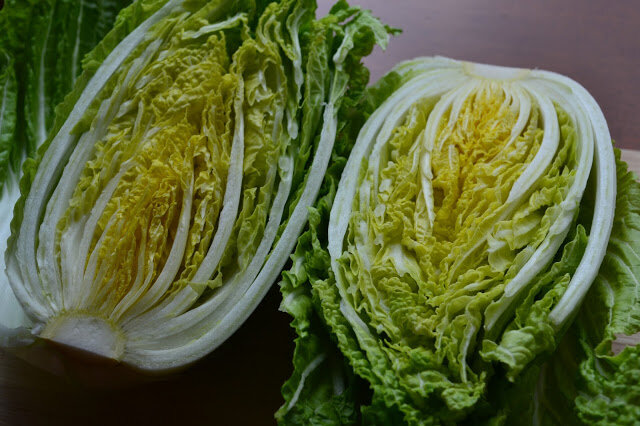Homemade Kimchi
I am a self-proclaimed kimchi addict. The first time I ever tried it was at my favorite sushi restaurant in New York rolled up into a nori roll. The kimchi was made by the restaurant owner's wife, who was the sweetest Korean lady. The moment I tried her kimchi, it was love at first bite. I would have weekly cravings for her kimchi rolls and every time I ate one, I was totally blissed out. And to be honest, I've tried lots of kimchi since then, and none even come close to the flavor of hers. But put some kimchi, any kimchi, in front of me, and I'll still eat it all up in no time.
So what is a kimchi addict supposed to do when they end up spending up to nine dollars a jar on the stuff, only to have it disappear within a few short days? Make lots of homemade kimchi, of course! It's actually incredibly easy to make and is so much cheaper than buying it. And you get to have total control when it comes to ingredients.
Kimchi is a traditional Korean condiment made with little more than Napa cabbage, some vegetables (even fruit!) of your choice, ginger and garlic, and spicy red pepper. These ingredients are all mixed together with some sea salt and fish sauce (or you can omit the fish to make vegan kimchi, which is still delicious) and packed into jars to ferment. Yes people, I said ferment. Yup, you leave the jars out on your countertop for about a week (I like letting it go even longer) and the salty vegetables soon turn into a tangy, spicy, irresistable condiment teaming with beneficial bacteria.
Why are fermented foods, like kimchi, so good for you? Well, like I said above, they're filled with beneficial bacteria that do miracles for your digestive health, and overall health, really. Probiotics (good bacteria found in fermented foods) are responsible for promoting regular bowel movements, strengthening the immune system, normalizing skin conditions, reducing cholesterol, maintaining bone health, and managing blood sugar levels. Also, the vitamin content of the raw fermented vegetables is actually increased the longer they ferment. By eating fermented foods, you're basically getting what you would get in a probiotic supplement, but in a food form, which is always better, in my opinion. Some other whole food sources of probiotics include lacto-fermented sourkraut and pickles, miso, yogurt, kombucha, kefir, and lots more!
Be sure to check out two great books all about fermentation, 'Wild Fermentation' and 'The Art of Fermentation', both by Sandor Ellix Katz. And, there are lots of fabulous food blogs and articles out there with incredible fermented food recipes, so just do some googling and you're on your way!
Kimchi
1 large head Napa cabbage, cut into bite sized pieces
2 baby bok choy, cut into bite sized pieces
3 large carrots, grated
1 daikon radish, julienned
1/2 of an onion, thinly sliced
1 apple, grated
5 scallions, cut into 1" pieces
7 cloves garlic, peeled
3" piece of ginger, peeled and cut into pieces
1/4 to 1/3 cup crushed red chili flakes, depending on how much heat you like
1/4 cup fish sauce (optional if you want to make it vegan)
1/4 cup unrefined sea salt
1. In a very large bowl, add the Napa cabbage, bok choy, carrots, daikon radish, apple, scallions, and onion.
2. Add the garlic, ginger, and red chili to a food processor. Process until it forms a paste. Add this paste to your big bowl of vegetables.
3. Add salt and fish sauce to the bowl and massage everything with your (clean!) hands for 4-5 minutes until the vegetables start to break down and there is liquid forming at the bottom of the bowl.
4. Transfer the kimchee to one very large clean jar (or a couple of clean smaller jars), making sure to pack the vegetables in firmly, submerging them in brine. Make sure to leave at least 1 inch of free space at the top of the jars before securing the lids.
5. Leave the jars out on your countertop or in your pantry for a few days, periodically unscrewing the lids slightly to let out carbon dioxide. Also, I made sure to push the vegetables down under the brine with a clean fork every other day. After 3 days, you may begin to taste your kimchi. I liked the way mine tasted after 7 days, but feel free to let it go longer to get it really sour. When it is good and tangy to your liking, transfer the jars to the refrigerator where the kimchi can keep for months.




